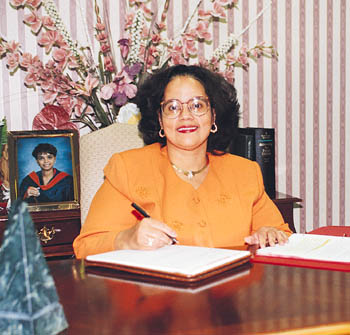Ensuring Reliable Service and Fair Rates for Rural Consumers

Until a few years ago, Dallas County farmer Robert Caine could hardly pick up his telephone without paying 28 cents a minute. Greensboro and Demopolis were on different exchanges. Even the county seat of Selma was long distance. “Back then, Dad had a phone; I had a phone; and the dairy had a phone,” recalled Caine, 59. “If you add all the calls together, our long-distance bill was more than $200 a month.”For Caine and other farmers who conducted business in the neighboring towns, the situation was intolerable. So Caine launched a personal mission to get the telephone company (GTE) to offer folks in the Safford, Orrville and Alberta communities an area-calling plan.His complaints fell on deaf ears, though, until he enlisted the help of the Alabama Farmers Federation’s utility rate expert, Yvette Smiley-Smith, CPA. With more than 25 years experience in the utilities field, Smiley-Smith was able to work with Caine, the Public Service Commission (PSC) and the PSC staff to develop a flat-rate plan that extended the local calling area to 20 miles. Later, the plan was expanded to 40 miles, and today Caine can call cities as far away as Montgomery, Auburn and Dothan without paying additional long-distance fees.Caine is just one of hundreds of rural Alabamians who have benefited from Smiley-Smith’s work. Since being retained by the Federation in 1984, Smiley-Smith has assisted members in scores of cases and often has represented their interests in proceedings before the PSC. In her first two years of work alone, it was estimated that she helped save consumers more than $20 million–including several cases where she helped get proposed rate increases reduced or eliminated.In the mid-’80s, however, the PSC–in attempt to slow spiraling rate increases–decided to implement a Rate Stabilization and Equalization (RSE) plan that automatically increased rates for South Central Bell and Alabama Power when their earnings dropped below a predetermined level. As a result, the emphasis of Smiley-Smith’s work shifted from examining requests for rate increases to working for more equitable service for rural customers. Today, she views her position as one of advocacy backed up by solid data and thorough analysis.”I’m looking out for consumers; the companies are looking out for their stockholders; and the Commission is trying to balance the two,” she said.With the implementation of RSE and the divestiture of the telephone monopoly, Smiley-Smith said it’s more important than ever for organization’s like the Federation to stay abreast of utility issues.”I’ve always believed that rate cases were the consumers’ best avenue to ensure rates are fair and equitable,” Smiley-Smith said. “We keep advocating that PSC not take off constraints too quickly because the worst-case scenario would be an unregulated monopoly under the guise of competition.”Even when the PSC was first developing RSE, Smiley-Smith and the Federation participated in the hearings and made recommendations to the Commission regarding the new rule’s impact on rural consumers.As a former director of the Commission’s rate-making staff, Smiley-Smith also used her expertise in the utilities field to help develop new electric rate plans for farmers. Prior to the implementation of those plans, many agricultural operations were billed at the same rate as large industries. Under the new plans, Smiley-Smith estimates that cotton ginners and peanut dryers have saved 9 percent to 22 percent, and catfish, poultry and dairy producers have reduced their electric bills by as much as 15 percent.But Smiley-Smith’s work is not limited to monitoring activities at the PSC. She testified before congressional committees when the Tennessee Valley Authority wanted to implement a “demand charge” for electricity used on farming operations. And, she filed comments with the Federal Regulatory Commission to ensure farmers are adequately compensated when utility companies file for eminent domain easements across productive farmland.More recently, Smiley-Smith worked with a key Alabama legislator to document precedent that would ensure consumers share in any refund Bell South receives as a result of Alabama’s franchise tax being declared unconstitutional. She also was supportive of the PSC and telephone company’s decision to implement 10-digit overlays when new area codes are introduced. These overlays allow customers near the area code boundaries to call their neighbors without being charged long distance fees.Sometimes, however, Smiley-Smith’s work is to simply provide information to Federation members. When Alabama consumers began receiving bills for 900 numbers they never called, she told members how to get the charges removed. And when telemarketers began harassing families, she told members how to get put on a “do-not-call” list.Today, Smiley-Smith often is called as an expert witness in legal proceedings throughout the country. But, she or technical assistant, Ingrid Graves, still attend the PSC’s monthly meetings, and they are “on call” to help Federation members like Caine resolve service disputes.”Our main focus is to make sure that, in the process of regulation, that the rural constituency is not forgotten,” Smiley-Smith said. “Though the terrain of utilities regulation has changed from the time I started with AFF. The need to protect the unique interests of farming constituency remains pretty much the same.”The cost of serving the farming community is always higher and availability of service providers is always lower,” she added. “But rural subscribers should not be left with a provider that services customers whenever it wants and charges whatever it wants. Our job is to make sure that, as changes occur within the utility area, there is proper planning that will safeguard prices and ensure our constituency always has reasonable rates and reliable service.” EDITOR’S NOTE:Federation members needing assistance with utility rate issues should contact their area organization director or Federation Executive Director Mike Kilgore.
